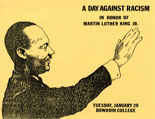Africana Studies Resources
Bowdoin College Archives
![Matthew Branche, Class of 1949. [Bowdoin College Archives, 6.1.13] - Born in Tuskeegee, Alabama, Matthew Branche, excelled academically, socially, and athletically at Bowdoin. He later earned a medical degree, served as a physician for the United States Olympic team, and was elected into the Bowdoin Athletic Hall of Honor. Branche, captain of Bowdoin’s track team and the first African American elected president of his class, became the first black member of a Bowdoin fraternity when he was initiated into Delta Upsilon, a move that ultimately caused the fraternity to split from the national organization, which opposed integration.](/arch/subject-guides/africana-resources/images/small/branche.jpg)
Matthew Branche, Class of 1949. [Bowdoin College Archives, 6.1.13]
![Bowdoin-Morehouse Student Exchange, 1963 [Bowdoin College Archives, 6.1.13] - Beginning in 1963 with weeklong exchanges of two students from each school, the Bowdoin-Morehouse program would expand to include several students attending the schools for an entire semester. Shown here are students from Morehouse College meeting with Bowdoin students in front of the Chapel.](/arch/subject-guides/africana-resources/images/small/morehouse.jpg)
Bowdoin-Morehouse Student Exchange, 1963 [Bowdoin College Archives, 6.1.13]
![1988 John Brown Russwurm Black Arts Festival. Poster by Stephen Petroff. [Africana Studies Program Records, 3.1.1]](/arch/subject-guides/africana-resources/images/small/baraka.jpg)
1988 John Brown Russwurm Black Arts Festival. Poster by Stephen Petroff. [Africana Studies Program Records, 3.1.1]

“A Day Against Racism,” 1981. Program cover by Stephen Petroff.
Please note when the library recently updated our online catalogs, the links in our subject guides broke. We are working actively to fix this problem. In the meantime, you can search for materials referenced by consulting the library catalog and our catalog of archives and manuscript materials.
Reflecting the College's long history of African American engagement, beginning with John Brown Russwurm's matriculation in 1824 and antislavery activities among College faculty, the Bowdoin College Archives are rich in documenting the black experience at Bowdoin. Included among the Archives' holdings are biographical files detailing the lives of African American alumni and collections that detail the efforts of black and white students to increase racial diversity and tolerance on campus. Administrative records trace College initiatives both to recruit more African American students and faculty and to provide ways for students of different racial backgrounds to express their own cultures while also integrating their diverse voices into a larger community of intellectual and social inquiry.
Histories
Historical overviews of African American issues at Bowdoin are available in a number of publications, including the Bowdoin Alumnus magazine and the student newspaper, the Bowdoin Orient, which provides particularly extensive coverage of civil rights issues during the 1960s and early 1970s and establishment of the Africana Studies program and the John Brown Russwurm African American Center. Especially useful are:
- “Bowdoin and Her Negro Graduates.” Bowdoin Alumnus, March 1939 . Writing in 1939, by which time nine African Americans were graduated from Bowdoin, J. Arnett Mitchell of the Class of 1912 reflects on the record and careers of these students.
- “Bowdoin College and the Black Student.” Maine Digest, fall 1970. In the wake of the civil rights movement, President Roger Howell, Jr. assess the history of African Americans at Bowdoin and articulates his vision for the African American Center.
- “The Blackman at Bowdoin,” by Kenneth Chenault (Dept. of History honors thesis, 1973). Kenneth Chenault, Class of 1973 and Overseer Emeritus, conducted interviews with African American alumni to study College attitudes towards blacks on campus.
- “Would John Brown Russwurm Apply to Bowdoin Today?” issued by the Admissions and Student Aid Committee to the Faculty and published in the Bowdoin Alumnus (late winter 1977), surveys efforts to recruit African Americans to the College.
Administrative Records
Administrative efforts to increase racial diversity, to incorporate Africana Studies into the curriculum, and to include the African American Center as part of campus life, are document through the files and reports of numerous College committees. Records series of especial note include:
- Africana Studies Program: Records, Files, and Reports, which contain annual reports, correspondence, files relating to events sponsored by the program (especially the John Brown Russwurm and Albert C. Boothby Lecture series), files concerning the divestment of the College's investments in South Africa, and a 1976 survey of New England College Black Studies Programs.
- Dean for Academic Affairs Records, featuring material concerning the founding of the Africana Studies Program as well as subsequent reports on the program's curriculum and administration.
- Office of the Dean of Student Affairs Records includes items relating to the Afro-American Society student group and the Afro-American Studies major.
- Roger Howell, Jr. Administrative Records relate to Bowdoin's exchange program with Morehouse College, the development of the Afro-American Studies Program, and the creation of African American Center.
- Office of Admissions Records and Publications, featuring brochures and other promotional items relating to recruitment efforts designed to appeal to African Americans.
Alumni Biographical Information
Biographical files of graduates and non-graduates of Bowdoin College and of the Medical School of Maine are maintained by the College. The files contain genealogical and career information as well as clippings and obituaries for African American alumni, beginning with Bowdoin's first African American graduate. In the nineteenth century, in addition to Russwurm, the College's affiliated Medical School of Maine matriculated five African Americans between 1848 and 1864. Information about these men can be found in the biographical files of the Medical School. Among those alumni are John Van Surlay De Grasse, Class of 1849, who was one of only eight African American surgeons to serve in the U.S. Army during the Civil War.
Student Organizations
Background material about and publicity for student groups related to African American issues and civil rights—including the Bowdoin Undergraduate Civil Rights Organization (BURCO), the African American Society, Bowdoin's Black Arts Festival, and Project '65—are found in Student Group and Organizations Records.